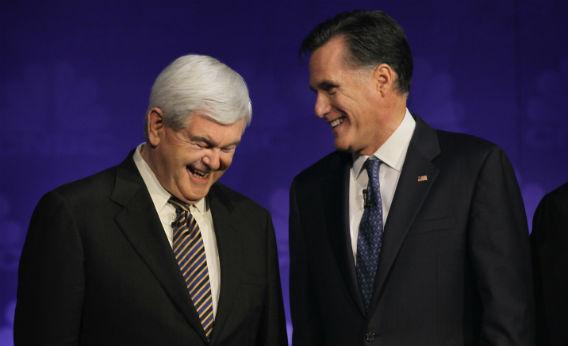NASHUA, N.H.—If Mitt Romney is weak broth, Newt Gingrich is a bouillon cube. Watching the two Republican presidential front-runners in New Hampshire over two days has been a study in contrasts. Romney is a known conservative ingredient suitable in a main dish. Gingrich is a powerful dose of partisan flavor to be used sparingly.
Gingrich is having his moment now because he offers punchy answers and ready solutions to seemingly insoluble problems. If he endures an examination of his personal baggage, his record on the issues, and his private-sector career, it will be in part because he is the “Republican Ideas Man.” But when you listen to those ideas—the scope of the change he is proposing, and the punch with which he delivers his pitch—you get the sense that that voters may not be interested in the Gingrich past because they’re too scared of the Gingrich future.
As Romney finished a four-day campaign swing through the state where he has dominated the polls, he touted his recent spending reduction plan and offered his carefully honed lines. President Obama “said if he was unable to get this economy turned around, he would be looking at a one-term proposition,” Romney said. “Well, I’m here to collect.”
Romney is the safe and steady candidate, and he joked about that when handing out sandwiches at a local diner.” This is Mitt Romney “raw and unleashed,” he said, referring to a Saturday Night Live skit that made fun of his boring personality. (It’s true: There are reports he returned a VCR tape in the late 1980s without rewinding.)
Listening to Gingrich is a more rock-’em–sock-’em experience. He’s a whirring dispensary of ideas and insults. He’s going to eliminate White House czars on his first day in office. The supercommittee “is the single dumbest legislative idea” he’s ever heard of. Government retraining will be available for lawyers who lose their jobs because of tort reform. The delay in building a border fence is “utterly stupid.”
It’s easy to see why Gingrich is appealing to Republican voters. They don’t need to imagine the stupidity in Washington that Gingrich lampoons. His ideas sound thoughtful. He is good with a political attack or jibe, which is appealing to voters trying to find the magic trick to beating an incumbent. So when Gingrich boasts that he is the best candidate because he can beat President Obama in debates, he adds that Obama won’t possibly say no to his suggested three-hour Lincoln-Douglas-style debate because an Ivy Leaguer would never admit to being “afraid to be on the same platform with a guy who taught at West Georgia College.”
Gingrich is competing on Romney’s turf with that claim about debates. Polls regularly show that voters believe Romney is one who can beat Obama. His business background gives him a good pitch on the economy. Gingrich is trying to leverage his impressive performances in the debates into an argument for why he can go the distance.
Like many of Gingrich’s theories, it sounds good—but general election debates will have a different audience. Gingrich won’t be pitching to conservatives looking for a fighting champion. He’ll be talking to independent and undecided voters. Do they really want Gingrich’s message of big change, brusquely delivered?
In scope and personality Gingrich asks a lot. He’s talking about profound change. (His boldness is a regular theme of his talks.) But people are already bounced around by change. Do voters really want a constant flow of it from the professor? Even if the strategy is to make government more efficient and get it out of your life, the main takeaway of the Gingrich idea flurry is that everything is going to get thrown upside down.
Gingrich delivers his ideas with punch. He lays waste to his enemies. But what’s the broad audience for a constant diet of stupid this and stupid that? He often talks like a bully. The targets are worthy enough—the media, bureaucrats, lawyers, those who don’t agree with him. But even Nixon talked about “the lift of a driving dream.” The overwhelming feeling conveyed at a Gingrich event is that if voters will only help cut the Lilliputian ropes, his genius will be free to roam the land. Political analysts talk about the living room test: Do you want this candidate in your living room every night? Gingrich might be a little hard to take over the TV dinner for four to eight years.
